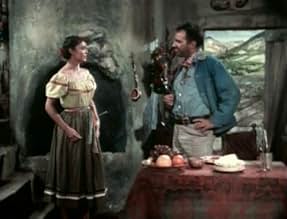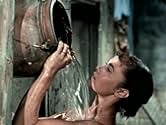NOTE IMDb
6,6/10
756
MA NOTE
Santiago, l'auteur d'un hold-up pris dans l'engrenage de la violence, trouve refuge dans une ferme isolée du Haut-Mexique. Le couple de fermiers est attiré par cet intrus : l'homme par cupid... Tout lireSantiago, l'auteur d'un hold-up pris dans l'engrenage de la violence, trouve refuge dans une ferme isolée du Haut-Mexique. Le couple de fermiers est attiré par cet intrus : l'homme par cupidité, la femme par désir.Santiago, l'auteur d'un hold-up pris dans l'engrenage de la violence, trouve refuge dans une ferme isolée du Haut-Mexique. Le couple de fermiers est attiré par cet intrus : l'homme par cupidité, la femme par désir.
- Réalisation
- Scénario
- Casting principal
- Récompenses
- 1 nomination au total
Eumenio Blanco
- Bartender
- (non crédité)
Edward Colmans
- Police Officer
- (non crédité)
Bert LeBaron
- Brawler
- (non crédité)
Jose Portugal
- Hood
- (non crédité)
Armando Rodriguez
- Bar Patron
- (non crédité)
Rosa Turich
- Vendor
- (non crédité)
Avis à la une
The movie's not a western in the usual sense. Instead, it's more like a pondering of character and life-styles set in modern Mexico. Manuel and Maria are in an arranged marriage, she being passed along like a piece of property, he being a budding farm entrepreneur. They are above all "respectable", and the feeling is that this is what holds the marriage together.
Then, into their settled life arrives escaping train robber Santiago. But he's not a typical robber. We know that from his buddy's moving death scene. There Santiago shows something of a poetic sensitivity, proving he's not without his own sense of values. In fact, he's more a free spirit than a criminal type, even giving away much of his loot to deserving strangers. Ironically, however, he appears unfree to be anything but free!
It's Santiago's free-wheeling effect on the young couple's brittle marriage that makes up the storyline. Kennedy, of course, was one of that era's premier actors. Here, his bravura performance effectively dramatizes Santiago's free spirit gusto. On the other hand, as the young couple, Iglesias and St. John appear over-the-top at times. Perhaps that can be rationalized by their emotional release from repressed lives. Nevertheless, the emoting does at times distract from story advancement.
The notion of respectability is also pondered here. What the screenplay seems to be saying is that conforming lives are okay as long as one's humanity is not sacrificed in the process. In his own eccentric way, this appears the lesson Santiago imparts to the young couple. At the same time, religion gets much the same treatment, while criminal Santiago acts poetically as a kind of secular priest in easing his dying confederate into the great unknown.
All in all, the movie's distinctive features come more from blacklisted writer Zimet's offbeat screenplay than from cult director Ulmer who's required to film in Technicolor instead of his b&w forte. Nonetheless, the movie's fully deserving of the Ulmer brand-- an offbeat 80-minutes that manages some depth over and above its tacky 50's title.
Then, into their settled life arrives escaping train robber Santiago. But he's not a typical robber. We know that from his buddy's moving death scene. There Santiago shows something of a poetic sensitivity, proving he's not without his own sense of values. In fact, he's more a free spirit than a criminal type, even giving away much of his loot to deserving strangers. Ironically, however, he appears unfree to be anything but free!
It's Santiago's free-wheeling effect on the young couple's brittle marriage that makes up the storyline. Kennedy, of course, was one of that era's premier actors. Here, his bravura performance effectively dramatizes Santiago's free spirit gusto. On the other hand, as the young couple, Iglesias and St. John appear over-the-top at times. Perhaps that can be rationalized by their emotional release from repressed lives. Nevertheless, the emoting does at times distract from story advancement.
The notion of respectability is also pondered here. What the screenplay seems to be saying is that conforming lives are okay as long as one's humanity is not sacrificed in the process. In his own eccentric way, this appears the lesson Santiago imparts to the young couple. At the same time, religion gets much the same treatment, while criminal Santiago acts poetically as a kind of secular priest in easing his dying confederate into the great unknown.
All in all, the movie's distinctive features come more from blacklisted writer Zimet's offbeat screenplay than from cult director Ulmer who's required to film in Technicolor instead of his b&w forte. Nonetheless, the movie's fully deserving of the Ulmer brand-- an offbeat 80-minutes that manages some depth over and above its tacky 50's title.
Fascinating little gem of a movie offering a slice of life and circumstances that makes one ponder about it all. The film is raw in its depiction of real life not setting the stage for anything but instead jumping right into one life dynamic after another. We watch as we see and relate of how senseless and unsatisfying the lead players life is but in no way will you condemn him simply because a bit of it exists in you. That's what keeps you engaged. Its to see how he would handle these scenarios and would it be different than your approach? He steals, lies, plays with morals, corrupts and mocks (plus more) yet he does it without denial. Actually there is a sorrow about his existence and for that reason, you forgive him. The supporting players do well to help drive the human nature points especially about temptation which visit casually and effectively with them all. The thing is, can they recover? Learn from it? Not repeat it? At no time to you believe that the main player likes what he does but at the same time effectively convinces the viewer that he doesn't know what he does or what to do different except after the fact. Some of his after (s) come with consequences. There is a theme in this movie of a simple life versus a non-simple life and it asks this question? Is your life simple good or simple bad? In other words, are you hiding out and avoiding or have you found contentment and peace? Only the viewer will know. This movies has a slow but meaningful pace and Arthur Kennedy carries it along without effort. If you find this, watch it and learn from it. Have a tasty drink and some Mexican food on standby as there are beans, tacos, tortillas scenes that you can eat along with. Of course, a tasty drink too and not because they drink tequila and pulque but to wash your meal down. BTW...pulque is a fermented alcoholic milk-looking type drink made from cactus type plant popular in Mexico. If a man cannot hold his pulque well he has some work to do. Also, there is a custom that if someone pours you a glass, you must drink it down. Its the second one you get to sip...
This movie provides the viewer with an opportunity to see a truly gifted,if unsung actor, in a role that he owns. Arthur Kennedy played many supporting roles in the 40's and 50's and was nominated five times for an Oscar as Best Supporting Actor. During that time he acted for most of the outstanding directors of the period and with actors like Mitchum,Sinatra,Douglas,to name a few. Long overdue for a memorable starring role, he finally has the lead in this movie. As Santiago he demonstrates how callousness and gentleness of spirit can reside believably in the same person. His contact with th peasant couple ultimately changes forever their views of the future as well as his own and final redemption. This is a movie one can see only on TV late shows. A pity, but if you're lucky enough to catch it, you'll be rewarded. Guaranteed.
A compelling movie of a different kind. When a low budget movie that was filmed in 10 days with very few characters, markedly rivets ones attention, that is a telltale sign of a a good and unusual production. The attire and settings were very convincing. The three leading characters all portrayed Hispanics extremely unusual for a 1950s western. The acting/directing was very good. The movie discusses female servitude/abuse; and the lure of money and its impact on ones loyalty, profession, and romantic decisions. With few characters and a low budget, the movie project took the very little and turned into quite an interesting and believable flick, of a different kind, that found time to examine core aspects of human behavior. In the same general genre as For Whom the Bell Tolls, but yet so different. Wow!!
An excellent little western that shows what can be done with a good story, little money, character actors and inspired direction(i.e. with no studio interference). The story unfolds in a slow but well-controlled tempo and proceeds to show how greed changes a kind-hearted man and his family into vicious money-hungry people. Edgar Ulmer, a much underrated but top-grade director, knows how to bring out the deepest and most secret feelings of his characters, through the excellent direction of his actors (Arthur Kennedy gives the best performance of his career) and create tension and the right atmosphere. On the level of John Ford's "Wagonmaster"! Should be seen and enjoyed more often. Makes you want to see more of Ulmer's works. Andreas-27
Le saviez-vous
- AnecdotesFrançois Truffaut cited this film as an inspiration for Jules and Jim. In fact, he even mentions Jules and Jim in his review of this film. Truffaut's film came out six years later.
- ConnexionsFeatured in Edgar G. Ulmer: The Man Off-Screen (2004)
Meilleurs choix
Connectez-vous pour évaluer et suivre la liste de favoris afin de recevoir des recommandations personnalisées
Détails
- Durée
- 1h 22min(82 min)
Contribuer à cette page
Suggérer une modification ou ajouter du contenu manquant
















